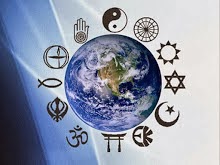We think that life is only limited to our body, just the activity of carbon and an admixture of molecules.We got a period of life after that we will be gone.Yes, just flash back and think what we say if someone die-he has gone.Q-Who has gone where? and answer we generally get in practical world to the heaven.Which means we all know that we are not only limited to our body something is within us which is "I" in reality or think like that the ends occurs only of object but remember we are not object.
We believe in death because we’ve been taught we die. Also, of course, because we associate ourselves with our body and we know bodies die.If we watch out we see blue sky,plants,buildings but that’s not the same for all.Some may not be watching blue sky or not so blue as u r experiencing.If thought poignantly then conclusion we could get is that its only state of mind or in other words consciousness. Yes your consciousness decides what to feel,see and how.Lets understand it scientifically--
Consider the famous two-slit experiment. When scientists watch a particle pass through two slits in a barrier, the particle behaves like a bullet and goes through one slit or the other. But if you don’t watch, it acts like a wave and can go through both slits at the same time. So how can a particle change its behavior depending on whether you watch it or not? The answer is simple – reality is a process that involves your consciousness .
An experiment published in 1990 suggests that Zeno was right . In this experiment, scientists demonstrated the quantum equivalent of the adage that “a watched pot doesn’t boil”. This behavior, the “quantum Zeno effect,” turns out to be a function of observation. “It seems,” said physicist Peter Coveney, “that the act of looking at an atom prevents it from changing”. Theoretically, if a nuclear bomb were watched intently enough – that is, if you could check its atoms every million trillionth of a second – it wouldn’t explode. Bizarre? The problem lies not in the experiments but in our way of thinking about time.
Or consider Heisenberg’s famous uncertainty principle. If there is really a world out there with particles just bouncing around, then we should be able to measure all their properties. But you can’t. For instance, a particle’s exact location and momentum can’t be known at the same time. So why should it matter to a particle what you decide to measure? And how can pairs of entangled particles be instantaneously connected on opposite sides of the galaxy as if space and time don’t exist? Again, the answer is simple: because they’re not just ‘out there’ – space and time are simply tools of our mind.
Death doesn’t exist in a timeless, space less world. Immortality doesn’t mean a perpetual existence in time, but resides outside of time altogether.
Many evidences are there which scientists are still searching and you know what the void of death has been mentioned already in the sacred scriptures, specially it has been clearly mentioned in detail in Shrimad Bhagwad Gita,to which Einstein also agreed after reading it.As after the death of his old friend, Albert Einstein said “Now Besso has departed from this strange world a little ahead of me. That means nothing. People like us … know that the distinction between past, present and future is only a stubbornly persistent illusion.”
TO BE CONTINUED-



0 comments:
Post a Comment